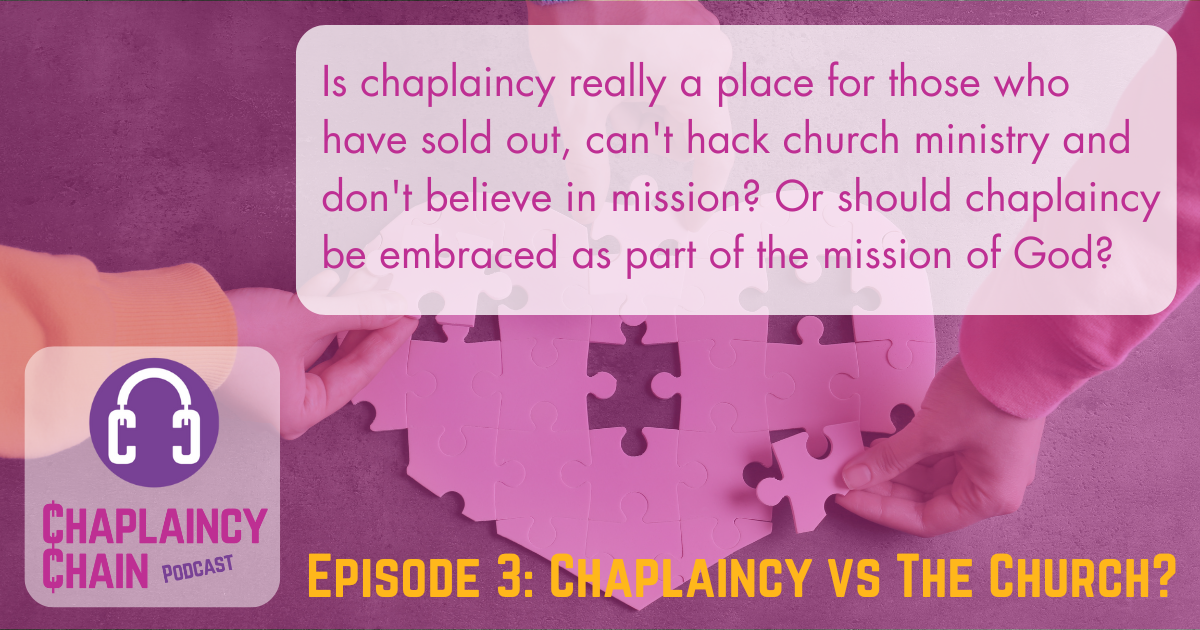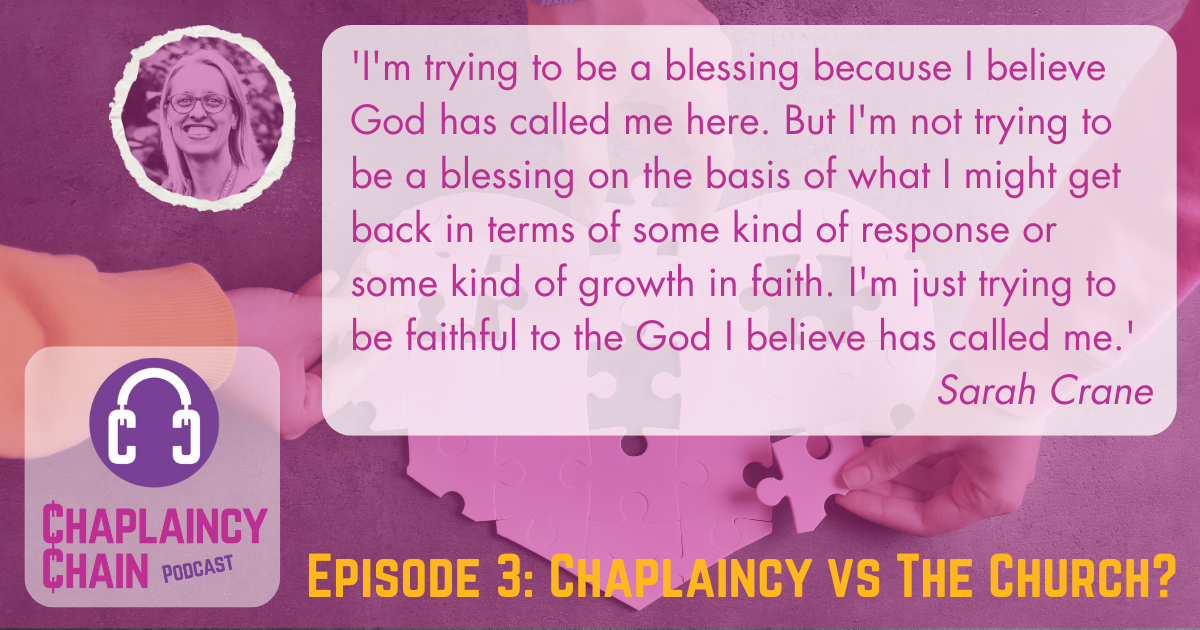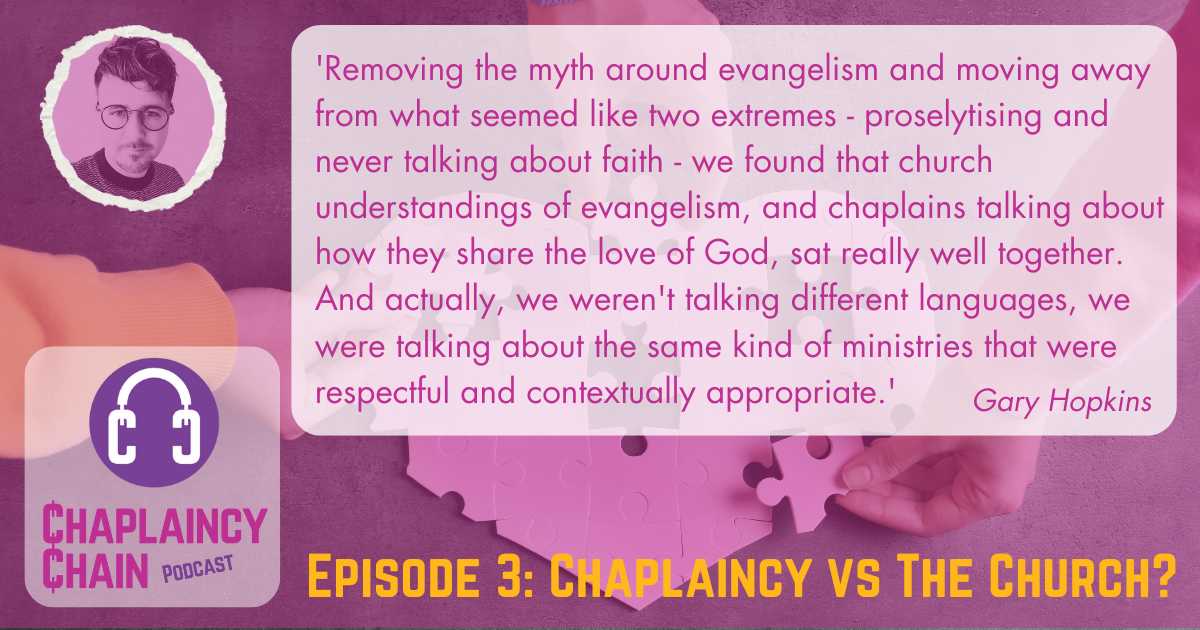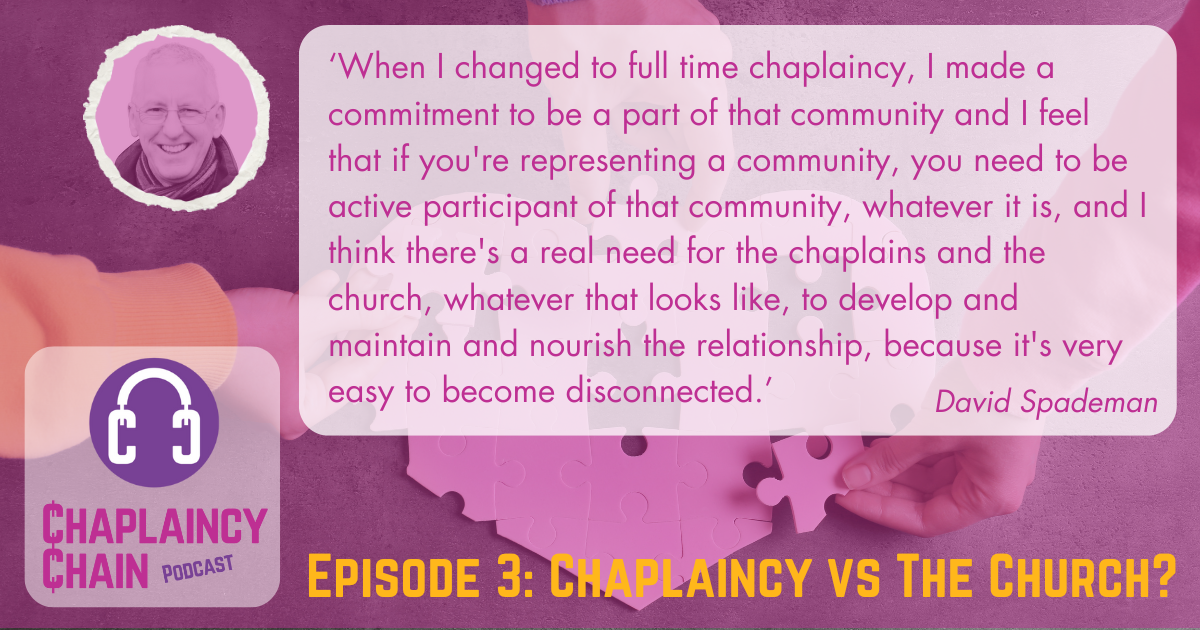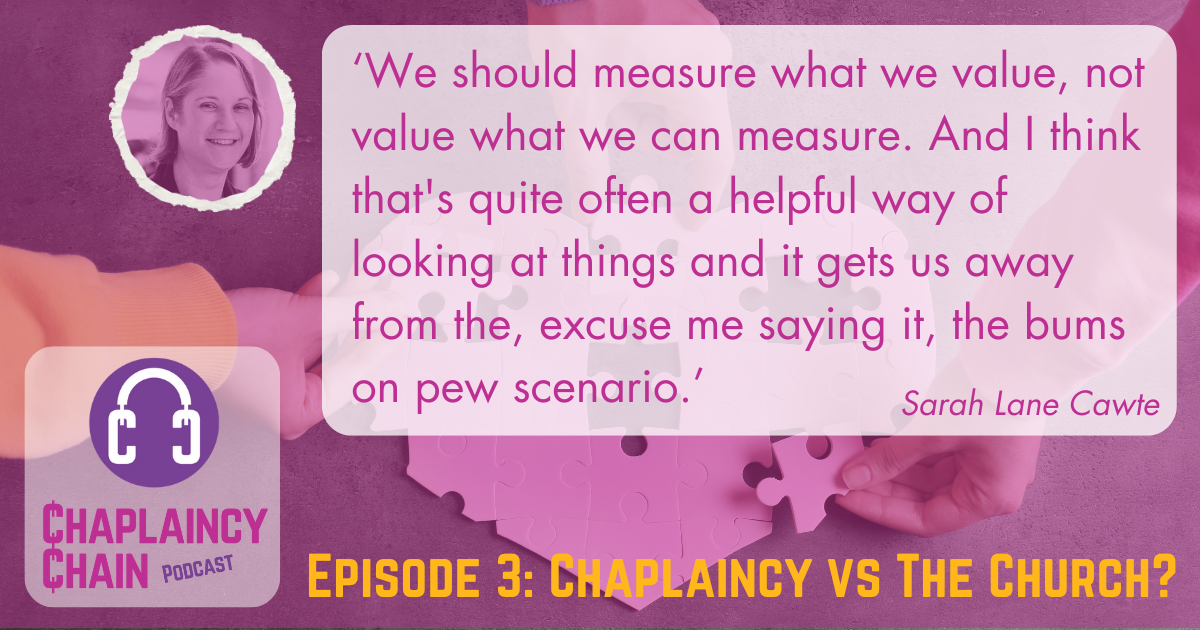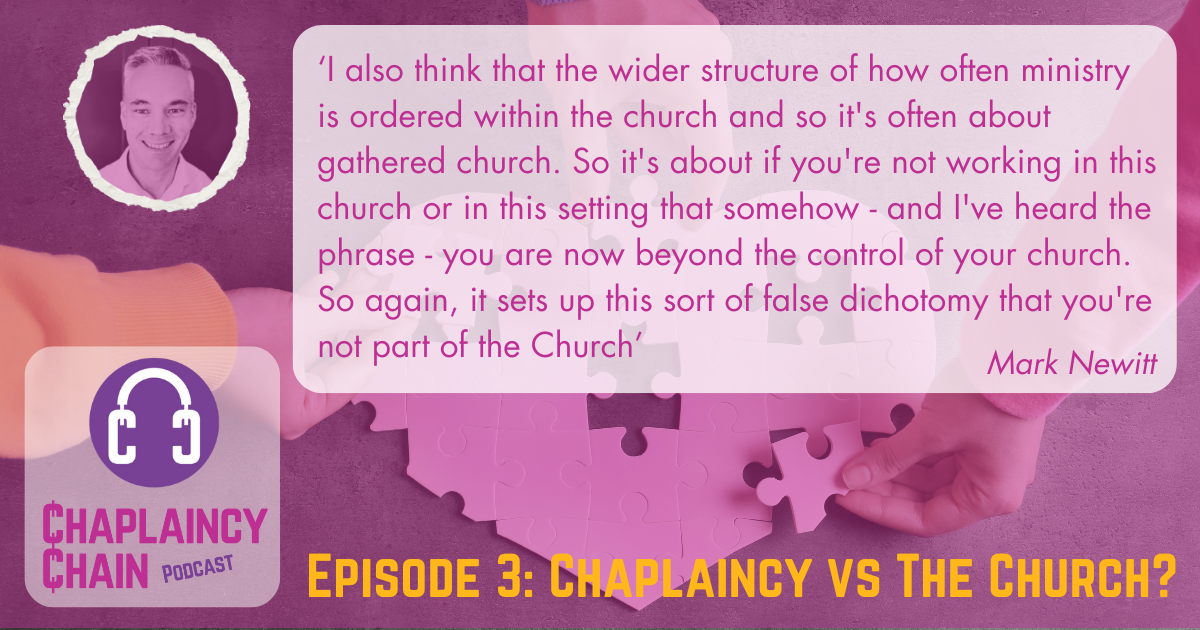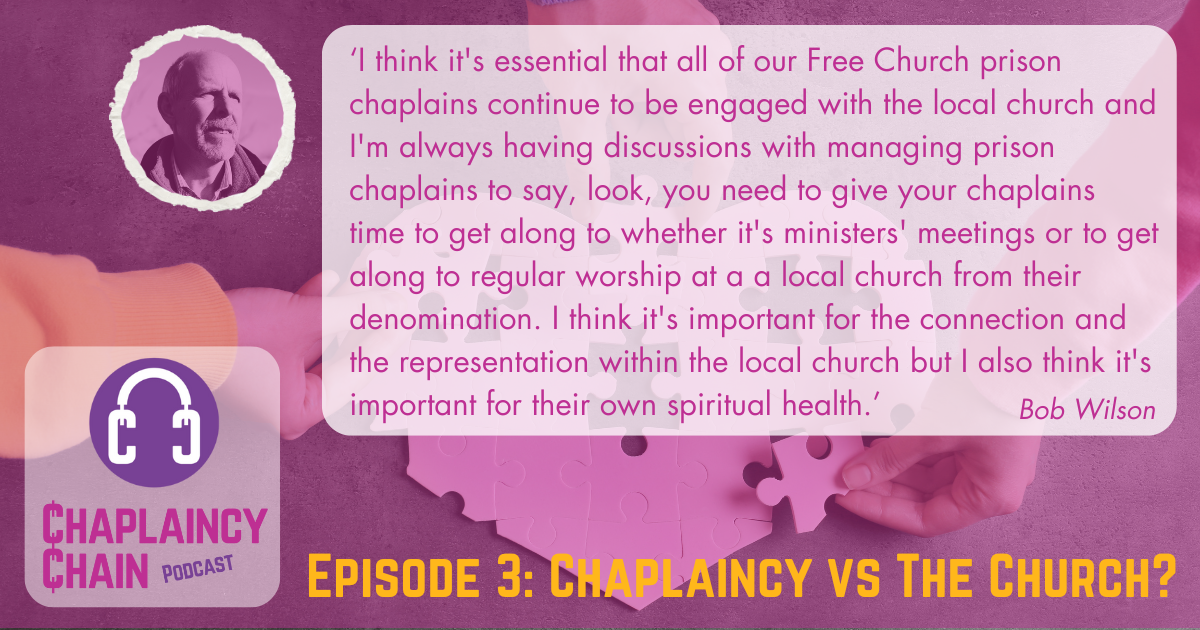Is chaplaincy really a place for those who have sold out, can’t hack church ministry and don’t believe in mission? Or should chaplaincy be embraced as part of the mission of God?
Listen
The Guests

Sarah Crane
Sarah Crane is a Baptist Minister and has been a chaplain at Milton Keynes University Hospital since 2014. Sarah chairs the Baptist Chaplaincy Forum and the FCG Healthcare chaplaincy steering group. Her favourite colour is green and when not working Sarah is most likely to be found walking in the fields near her house or reading a novel.

Gary Hopkins
Gary Hopkins, through his role as the Methodist Church’s officer for chaplaincy, has developed a deep passion for chaplaincy, which he sees as a vital part of the mission of God. He recognises chaplaincy as the way in which the Church gets alongside people, being part of the transformation of the world just like Jesus did during his earthly ministry and continues to do through the ministry of the whole people of God.

David Spademan
David Spademan is a Free Church Prison Chaplain with 22 years of experience. For the last 10 years has led a multi-faith chaplaincy team in a closed prison. He serves on the Assemblies of God GB National Chaplaincy Team and is on the Steering Group for Free Church Prison Chaplaincy in HMPPS.
Conversation Snippets

Sarah Crane
‘So I’m a Baptist minister, but I don’t do my work in the hospital or the hospice with any sense of power that benefits Baptist churches in any way because no one in the hospital cares about where I’m coming from in that sense. And so I’m not there as an agent of my denomination. I’m there, I hope to be an empty handed companion to whoever needs that support in that moment, and that morphs in so many different ways through the course of a week or a month or a year. And that doesn’t sit with the way that often our denomination thinks about what it means to be impactful in society and in the community and that we want more people coming to our Sunday service.’
‘I’m trying to be a blessing because I believe God has called me here. But I’m not trying to be a blessing on the basis of what I might get back in terms of some kind of response or some kind of growth in faith. I’m just trying to be faithful to the God I believe has called me.’
‘I think one of the keys to to relationships between churches and chaplains is having the best people we can lead in our churches. Whatever flavour they are so that they notice people so they recognise people’s contributions and so that people feel valued because all of us want to feel valued. And I think sometimes where chaplains become kind of a bit fragmented away from churches because they feel unseen and unvalued’

Gary Hopkins
‘I I know of people that, in the past, have left church ministry because of some of the views of the Church, and they’ve found chaplaincy to be a a more accepting and affirming place. To think that one form of ministry is easier is very narrow. They each have their complexities and people have to use their gifts in the places that match well with what they’re called to do.’
‘When when you move into a chaplaincy role, your connection with the structures in the church, even just simple things like attending meetings, those natural points of contact become less and less. And so, without some sort of intentionality, you can drift quite easily.’
‘A key part of my role is to find the moments where when the church is thinking (and I mean institutional church, because I talk of the the wider church to mean chaplains as well), and when it’s thinking it often falls into this trap of thinking gathered church first and then secondary thinking about other aspects of life. And I just keep banging on about where chaplains fit in. Where do chaplains fit in?’
‘Removing the myth around evangelism and moving away from what seemed like two extremes – proselytising and never talking about faith – we found that church understandings of evangelism, and chaplains talking about how they share the love of God, sat really well together. And actually, we weren’t talking different languages, we were talking about the same kind of ministries that were respectful and contextually appropriate.’
‘I think one of the things that is a real richness around chaplaincy is the collaboration we have between organisations and church denominations. The thing I very quickly discovered was most people in chaplaincy, see themselves as chaplains first, denomination second, and they’ll work with colleagues of all sorts of faiths and denominations and that’s really good.’

David Spademan
‘I’ve used the analogy with the military, where you train someone for regular service who might be a local church leader, but then we need the technical specialists to come into chaplaincy.’
‘When I changed to full time chaplaincy, I made a commitment to be a part of that community and I feel that if you’re representing a community, you need to be active participant of that community, whatever it is, and I think there’s a real need for the chaplains and the church, whatever that looks like, to develop and maintain and nourish the relationship, because it’s very easy to become disconnected.’
‘I think a real contrast to the difference between local church ministry and chaplaincy was the the pandemic so local church leaders during the pandemic thought what we’re going to do now, we can’t gather people together. Whereas the prison chaplains in this, it was business as usual. So we were working harder than we were before the pandemic, having to go in and support the staff support those in custody and so the workload increased kind exponentially within that time, which shows a little bit of a difference of emphasis.’
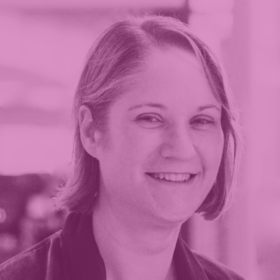
Sarah Lane Cawte
‘I remembered a quote and I think it’s one of those quotes no one quite knows who said it: we should measure what we value, not value what we can measure. And I think that’s quite often a helpful way of looking at things and it gets us away from the, excuse me saying it, the bums on pew scenario.’
‘Love Sarah’s story about the wine and the chocolates. It’s a little thing, but it actually means such a lot. So perhaps that will challenge some of us to think about how we actually show everybody our appreciation for their roles. But particularly chaplains, because they often get left out.’

Mark Newitt
‘Just as people have come into chaplaincy by being nurtured by the church, in the majority of cases, also their ongoing ministry is nurtured through being part of a local community where they gain their strength, where their spirituality is nurtured, the continue to have those root that enable them to do the complex emotional work that chaplaincy requires.’
‘I also think that the wider structure of how often ministry is ordered within the church and so it’s often about gathered church. So it’s about if you’re not working in this church or in this setting that somehow – and I’ve heard the phrase – you are now beyond the control of your church. So again, it sets up this sort of false dichotomy that you’re not part of the Church’
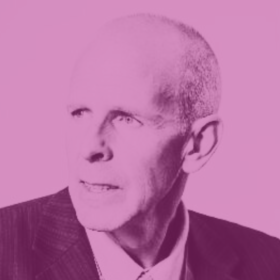
Bob Wilson
‘As someone who looks after prison chaplains, I think it’s essential that all of our Free Church prison chaplains continue to be engaged with the local church and I’m always having discussions with managing prison chaplains to say, look, you need to give your chaplains time to get along to whether it’s ministers’ meetings or to get along to regular worship at a a local church from their denomination. I think it’s important for the connection and the representation within the local church but I also think it’s important for their own spiritual health.’
‘So the word mission, you know it comes from that root of missio, which is a Latin root meaning sent. And it’s also the root for the word missile and the word missile is something that sent and I mean chaplains should be those who are sent not to explode things, but those that are sent like a cruise missile, but sometimes as chaplains, we can feel more like bombs that are just dropped. That may have started in the local church but then we’re just dropped and then we don’t have that connection back to the sending authority. And I think it’s so crucial that we do for our own spiritual health.’
Help promote this episode
Help raise the profile of chaplaincy by promoting The Chaplaincy Chain Podcast. You might like to use some of these images in social media posts. You should be able to download and save them by right clicking on the image you would like to use. We really do appreciate any support in telling others!


